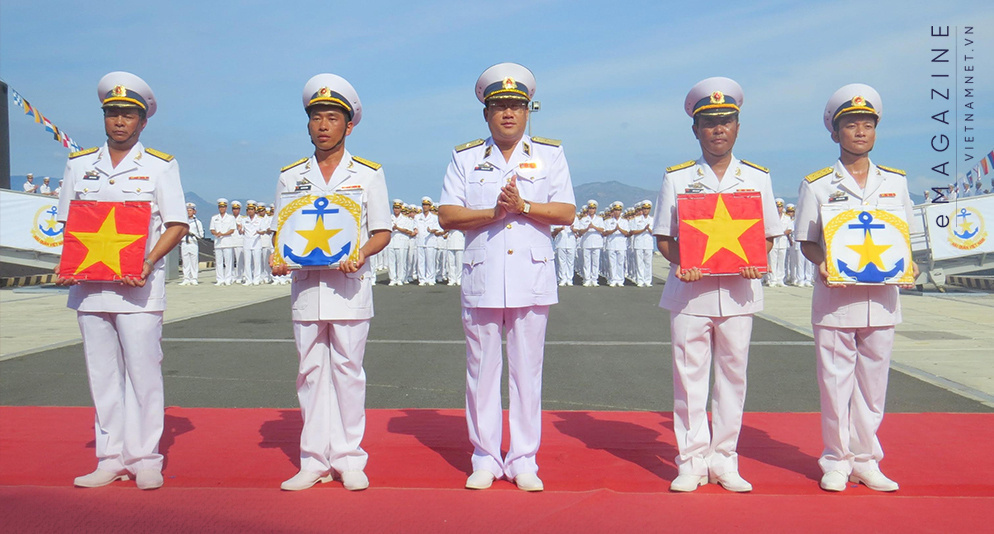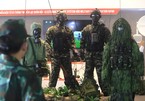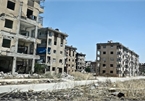
The motto of the force: "Special Solidarity; Special Discipline; Special Secret”.
“Submarine crews have to satisfy very high requirements. The best sailors are selected from numerous candidates from the Navy and other units of the army after a lot of rigorous tests,” said Senior Lieutenant Colonel Nguyen Van Quan, Political Commissar of Brigade 189.
“Submarine crews have to engage in combat in the deep sea, with lack of oxygen. There are gases harmful to human health such as carbon dioxide, hydro and nitrogen, as well as the magnetic field from weapons and technical equipment,” he explained.
In June 2011, Minister of National Defense issued a decision to establish the Submarine Brigade 189 under the Navy armed service.
Following the guideline of the Politburo and the Central Military Commission, in order to protect the sovereignty of the sea, islands and continental shelf of the country, in December 2009, Vietnam signed a contract to buy six Russian Kilo 636 submarines.
To best prepare for building the submarine unit, in 2010, the Navy Command issued a decision to establish a permanent framework for submarine force management, under the Staff of the Navy.
In March of the same year, with the support of Russian specialists, the naval force deployed the construction of a submarine base on Cam Ranh Peninsula.
On September 17, 2010, the Navy Commander signed a decision on the establishment of Submarine Squadron No 189, belonging to the Naval Staff, the predecessor of the Naval Submarine Brigade 189.
Colonel Nguyen Hoang Luyen, Deputy Head of the Military Medical Department, head of the selection committee in 2010, said that the selection was implemented in three levels.
Level 1: selecting candidates from all army units implemented by local military medical divisions.
Level 2: examining the shortlisted candidates at military hospitals in regions for screening.
Level 3: examining candidates at the units equipped with pressure examination tools such as Naval Medical Institute and the Submarine Regiment No 196.
“Many soldiers had very good health indicators were still refused. One solider in Naval Zone 1 was refused because of tooth decay. The soldiers who could not walk on straight line after vestibule exercises were also weeded out,” Luyen said.
Weight and height indicators are just simple requirements. Soldiers had to overcome more rigorous challenges with neurological and vestibular examination. Modern electrocardiogram and EEG machines were attached to the chest and head to record indicators.
They also had to practice revolving in a chair. After the practice, they had to stand up and go straight for a while before sitting down and doing a quick test to examine knowledge.
The hardest physical challenge is the supercharged test. Some people can withstand high pressure compression equivalent to a depth of 70m, even 100m.
The most difficult physical challenge is pressure compression testing. Some soldiers could bear the high pressure compression at the depth of 70 meters or 100 meters, but others felt tinnitus at the depth of 10 meters only.
Captain Nguyen Trung Kien, Deputy Head of the Information, Radar and Sonar Division of Submarine 184 in Hai Phong, still remembers the tests.
“I remember the doctors fastening the seat belt firmly and the chair starting to rotate continuously. As the chair was rotating, I had to tilt my head left and right and had to keep my eyes open,” he said.
After selecting the best candidates, the Submarine Squadron No 189 began building plans to ensure materials and documents for training.
On October 10, 2010, at a military base in Vinh Phuc province, the first training course was opened. Vice Admiral Tran Thanh Huyen, Political Commissar of the Navy, came to assign the tasks to this special training course.
“These are the cadres who laid the first bricks for the formation of a new force that the Party, State, Central Military Commission and the Ministry of National Defense was determined to build into a unit advancing to modernity,” Quan said.
Major Ha Van Ty, Commissar of Submarine 183 in HCM City, said: “We defined five criteria for ourselves with ‘three special, four good things and five nos’ to gather spirit and will on the training."
The ‘five nos’ were no violation of conduct, no profanity, no violations of the ‘three completions’ principle, no loss of safety and no smoking. Ty said everyone has to abstain from smoking because submarine crews must not be dependent on any stimulants. They must be sure that their mind is in good condition to perform tasks and ensure safety against fire and explosion.
He recalled a bloody lesson of what happened to an Asian military powerhouse that had bought some Kilo 636 submarines from Russia. As sailors were careless in smoking, one submarine caught fire and sank.
After the establishment, the Party Committee of the Submarine Squadron No 189 decided that it was necessary to quickly stabilize the organization, and begin the tasks of learning foreign languages and physical training.
At the same time, they have to implement the motto of the force: "Special Solidarity; Special Discipline; Special Secret”.
Minh Thuy - Quang Thang

Vietnam’s modern weapons presented at Army Games
Under the framework of the Army Games 2021, the Ministry of National Defense of Vietnam has organized a cultural space and an exhibition of weapons and military equipment in Hanoi.

Vietnam affirms stance on condemning use of chemical weapons
Vietnam affirmed its stance on condemning the use of chemical weapons and emphasised the need to respect and fully implement the Chemical Weapons Convention at the United Nations Security Council’s meeting